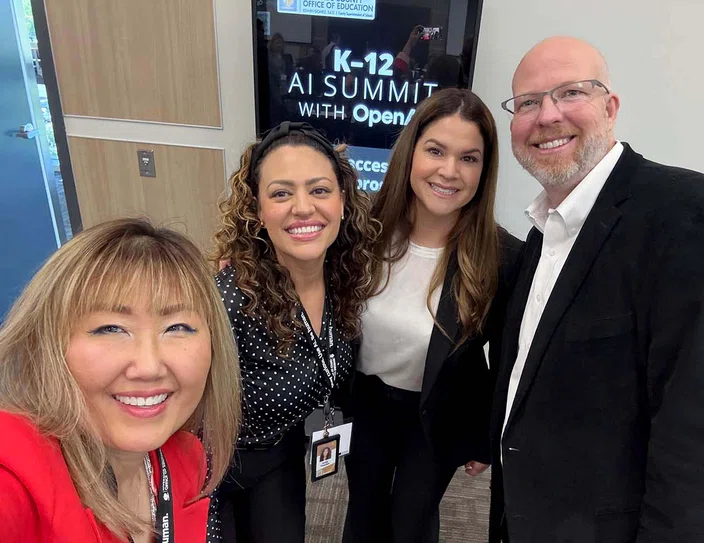
Dr. Julie Hong has championed wellness centers and partnered across departments to add behavioral intervention teams and licensed clinical social workers to serve the highest-needs learners in Riverside County.
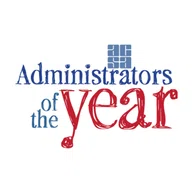
Name: Dr. Julie Hong
Award: Special Education Administrator of the Year
Title: Director of Instructional Support, Innovation, and Competitive Advantage, Riverside County Office of Education
ACSA highlights: Member since 2009; serves on ACSA’s Member Services Committee; serves as Region 19 Vice President of Membership.
Dr. Julie Hong has experience transforming school systems. ACSA’s 2025 Special Education Administrator of the Year has combined equity, evidence-based practice and inclusive collaboration in her current and previous work.
When Hong worked for Menifee Unified School District, she led a task force to address racial disproportionality in discipline for students with disabilities while expanding social-emotional and behavioral supports aligned to Multi-Tiered Systems of Support. Within three years, the task force was successful in eliminating disproportionality. Hong also championed wellness centers and partnered across departments to add behavioral intervention teams and licensed clinical social workers to serve the highest-needs learners.
Hong’s portfolio includes designing inclusive preschool models that integrate California State Preschool Program objectives with special education, and launching innovative secondary programs such as Achieving Beyond Learning Experiences and Practical Academics and Community Education. She has implemented countywide professional learning opportunities and has co-authored the implementation guide for Patterns of Strengths and Weaknesses, a critical resource for the North Coastal Consortium for Special Education.
“Dr. Hong has been a remarkable leader, consistently showing a willingness to collaborate with her special education staff,” said Adapted Physical Education Teacher DiAnna Cullen of Menifee USD. “She makes herself available to listen to concerns and suggestions and works proactively to address them, either by finding solutions through teamwork or by explaining clearly when something isn't feasible.”
What’s your favorite book or quote on leadership?
“A beautiful question is an ambitious yet actionable question that can begin to shift the way we perceive or think about something, and that might serve as a catalyst to bring about change.”
– Warren Berger, A More Beautiful Question
This quote defines how I lead. I believe innovation in education doesn’t begin with answers; it starts with courageous questions. As a special education leader, I often ask: What would education look like if we designed every space to cultivate self-discovery, nurture a deep sense of belonging and foster a community of collegiality and care? That kind of question has driven the design thinking that shapes innovative programs. It helped me redefine how systems operate and why they do. For me, a beautiful question is not a detour from leadership; it’s a path to transforming it.
What’s the best advice you’ve ever been given?
One guiding principle that has shaped my leadership journey is this: You discover authentic opportunities in the gaps. By stepping into the gaps with purpose, where students are overlooked, voices are missing, and systems fall short, my work became the most meaningful. Since then, I have filled the gaps in Special Education, turning needs into opportunities through meaningful family engagement, innovative inclusive practices, MTSS, and creating accessibility for students with special needs within General Education, as well as redesigning instruction and classroom structures in our highly impacted classes.
What’s your best strategy for work-life balance?
Work-life balance is not about rigid lines. It’s about energy. I seek joyful moments with colleagues, students, family, and friends. I’ve learned to celebrate, laugh, and create pockets of joy wherever I am. That’s what restores me. I focus on becoming a magnet for joy, and that balance starts to find me. It’s not about stepping away from the work; it’s about building a life where my work is filled with meaning, movement and moments that matter.
What are some life hacks that you would recommend for a new administrator?
These are the life hacks that have enabled me not just to survive, but to thrive:
- Ask for feedback, and stay open to it. The faster you let go of “needing to be right,” the faster you grow.
- Don’t take yourself too seriously; laughter is essential.
- When we’re too focused on protecting our identity or our ideas, we unintentionally close ourselves off to innovation. Design thinking is your friend; everything is an iterative process. You don’t need the “right answer” on day one; you just need to keep moving with curiosity and care.
- Build your 90-day vision before you build your to-do list.
- And one more thing: tell your story. Be clear about who you are and what you value, because if you don’t shape your narrative, someone else will.
What would people be surprised to learn about you?
I’m a first-generation Korean-American daughter of immigrants who grew up in L.A.’s Koreatown. Although I grew up rooted on the West Coast, my heart has always been drawn to the energy, diversity and culture of New York. I love travel, good food and vibrant cities. Manhattan speaks to all three loves: museums, Broadway and Rainbow Bagels!
What made you want to become a school administrator?
Education called me. I never really fit the mold of what most people imagine an educator to be, but my heart has always been with the students who don’t fit the mold either. Because I was that child. I remember dreading the moment a teacher would call on me. My English wasn’t fluent. I wasn’t the smartest kid in class or the most popular. I was the observer —the one quietly listening, carrying ideas no one ever asked to hear. Those early experiences stayed with me. They gave me a deep empathy for students who are too often overlooked — students with disabilities, students of color, students pushed to the margins. I became a school administrator because I wanted to be in the rooms where decisions are made. I knew that if I could get there, I’d carry the voices of those students with me, every single time. At the core, I didn’t step into leadership for a title. I stepped in to build the kind of schools I needed as a child. Places where every student is seen, heard and given a real chance to thrive.
What’s the biggest challenge you’ve overcome to get where you are?
One of the biggest challenges I’ve faced on my leadership journey has been learning how to navigate systems that weren’t built for inclusive educational practices. As an outside-the-box thinker, I lead with both strategy and heart, but early on, I had to find ways to bring my voice into spaces that didn’t always welcome bold ideas or new perspectives.
To grow, I had to stretch beyond what felt familiar. I started speaking up in rooms where I once stayed quiet. I developed skills that pushed me beyond my natural comfort zone and gradually built the confidence to share ideas that challenged the status quo. I also learned how to speak the truth with both clarity and care, honoring relationships while standing firm in my convictions.
Securing my first director position was one of the most demanding and transformative steps in that journey. I rarely saw people who looked like me in those roles, and stepping into that space required more than preparation; it called for resilience, vision, and a willingness to evolve.
That experience helped me discover deeper dimensions of leadership. I learned how to carry both responsibility and representation, and how to lead with quiet confidence, even when the path felt uncertain.
As I prepare for cabinet-level leadership, I remain grounded in the same mindset, open to growth and anchored in purpose, with a commitment to serving broader communities. I continue to show up because real, innovative change doesn’t happen when you’re accepted; it happens when you stay.
What are you most proud of accomplishing?
One of the things I’m most proud of is creating the All-Star Field Day, a fully inclusive, adapted celebration for students with disabilities. It began as a simple idea from our SEPAC President — a small event with a big heart — and it grew into something extraordinary.
What began as an idea for a small event evolved into a districtwide tradition. Then it expanded into our city and local churches, becoming a true model for what visibility, celebration and community can look like.
In just three years, that one day helped our Special Education Parent Advisory Committee grow from five parents to over 100. But more than numbers, it gave families a reason to come together, to be seen, to connect and to advocate side by side. It built bridges between systems and people in ways I’ll never forget.
I’m also proud to serve as the Vice President of Membership for ACSA Region 19. That role has given me a powerful platform to elevate voices across our profession, especially those of leaders of color and individuals who haven’t always had a seat at the table.
At the heart of both experiences is the same goal: to build spaces where everyone belongs and where every voice has the power to shape what comes next.
How has ACSA supported you in your career/current position?
ACSA has been more than a network; it’s been a lifeline. Through ACSA, I’ve found mentors, collaborators, and a shared language of purpose and belonging. Geoffrey L. Cohen reminds us that “Belonging” is foundational to growth, and ACSA has embodied that truth in every season of my leadership. From my first days as an aspiring administrator to my current role now serving as a member of the State Member Services Committee, I’ve felt the care, effort, and intentionality that goes into supporting members at every level. I’ve been shaped by the Academies, inspired at the conferences and strengthened by leaders who give their time to uplift others. I feel incredibly fortunate to be part of an organization that believes excellent leadership and deep learning are what ultimately enable our students to thrive.
The theme for this year’s Leadership Summit is “Lead Loudly: Sharing Stories, Building Bridges.” What does Leading Loudly mean to you?
For me, leading loudly isn’t about being the loudest voice in the room; it’s about leading with love, grounded in truth, and making others feel seen, heard and valued.
It means using my voice and influence to advocate for those who haven’t always been included in the conversation. It’s about making room for students, educators and families whose stories are essential to shaping a future that honors every child, regardless of background, learning style or lived experience. It’s about cultivating hope and creating a sense of belonging within an educational community that serves all.
The real power comes from standing alongside one another and amplifying the voices of courage to help shape a better tomorrow. Leading loudly begins with deep listening and grows through shared purpose. It takes courage to speak with honesty, humility to stay open, and joy to keep going. When we lead together in this way, we don’t just raise our voices, we lift each other up to create the change our students and communities deserve.
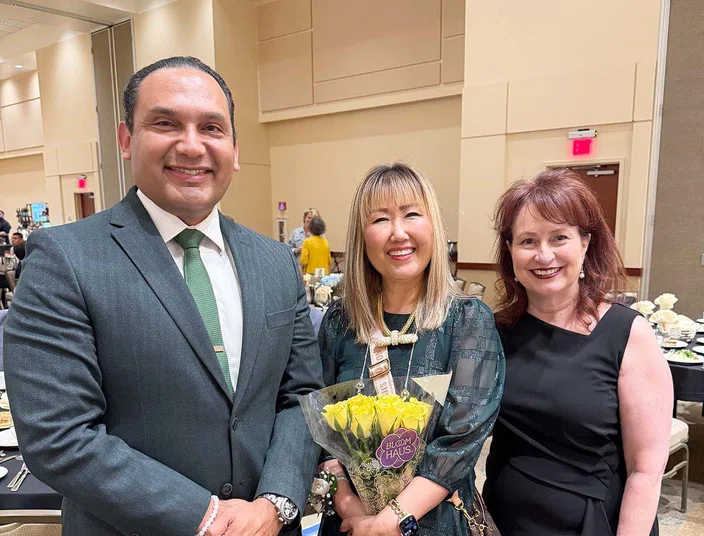
ACSA's 2025 Special Education Administrator of the Year Dr. Julie Hong.
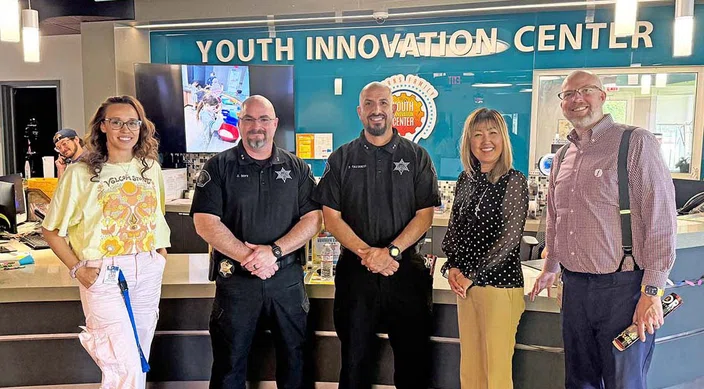
Hong championed wellness centers and partnered across departments to add behavioral intervention teams and licensed clinical social workers to serve the highest-needs learners.
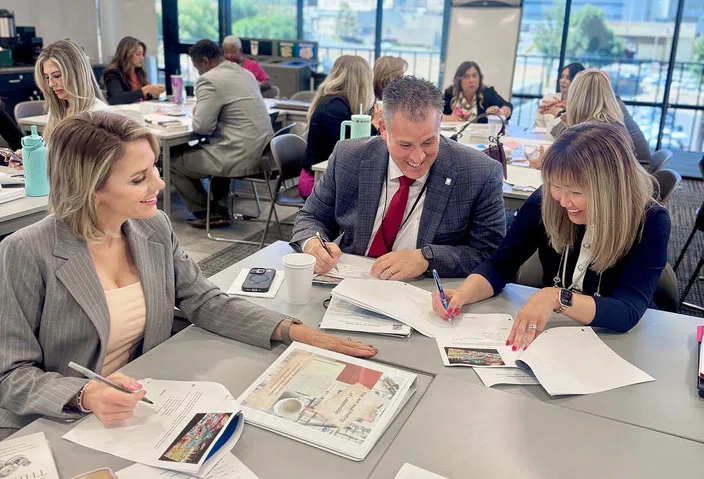
Hong’s portfolio includes designing inclusive preschool models that integrate California State Preschool Program objectives with special education




